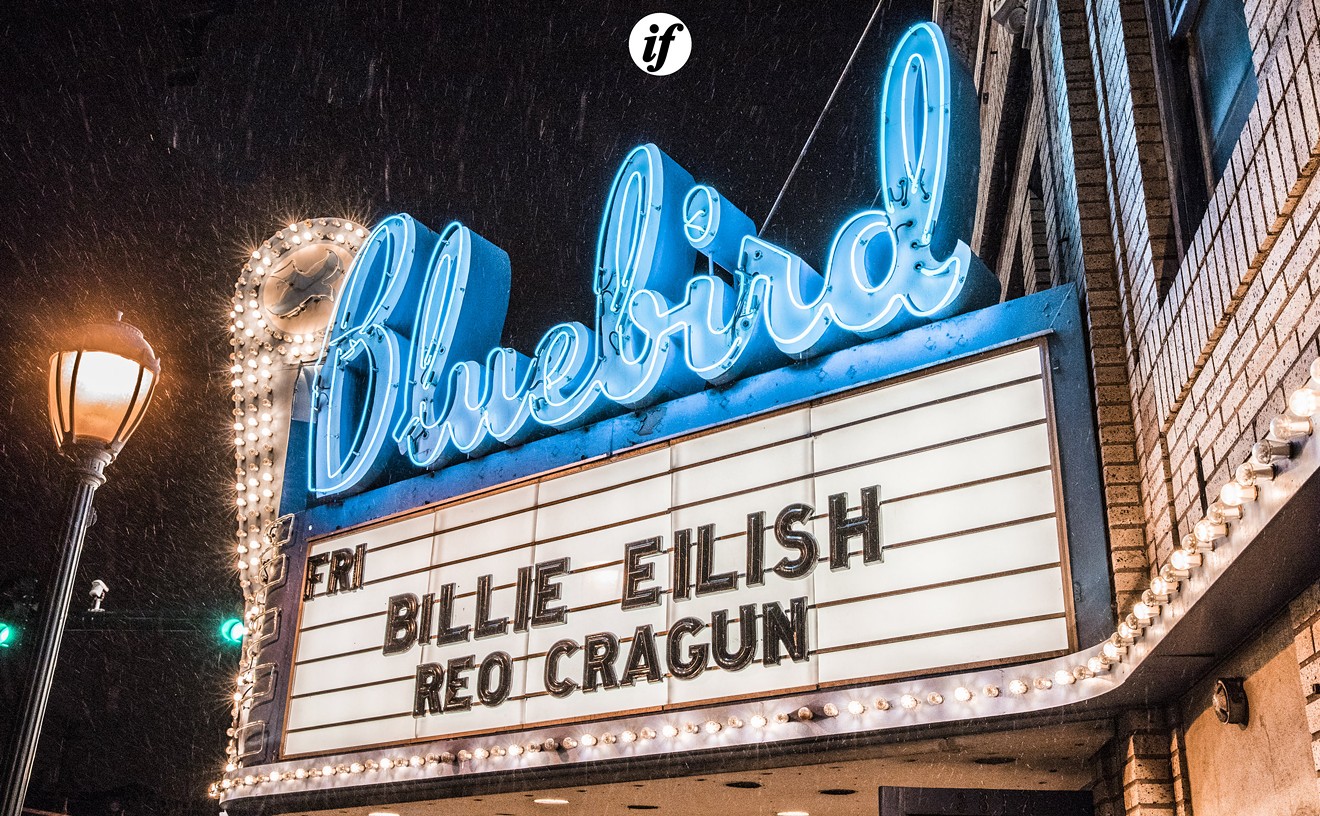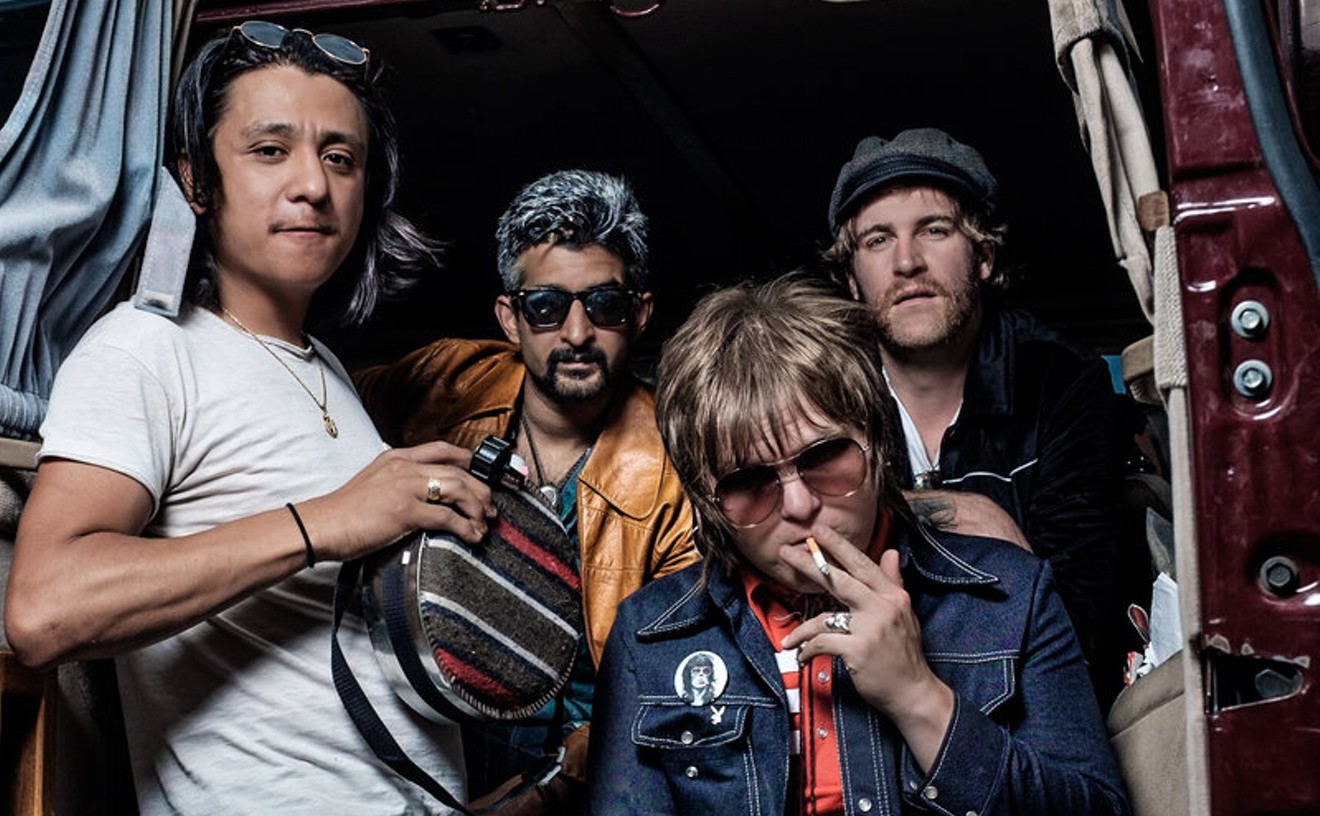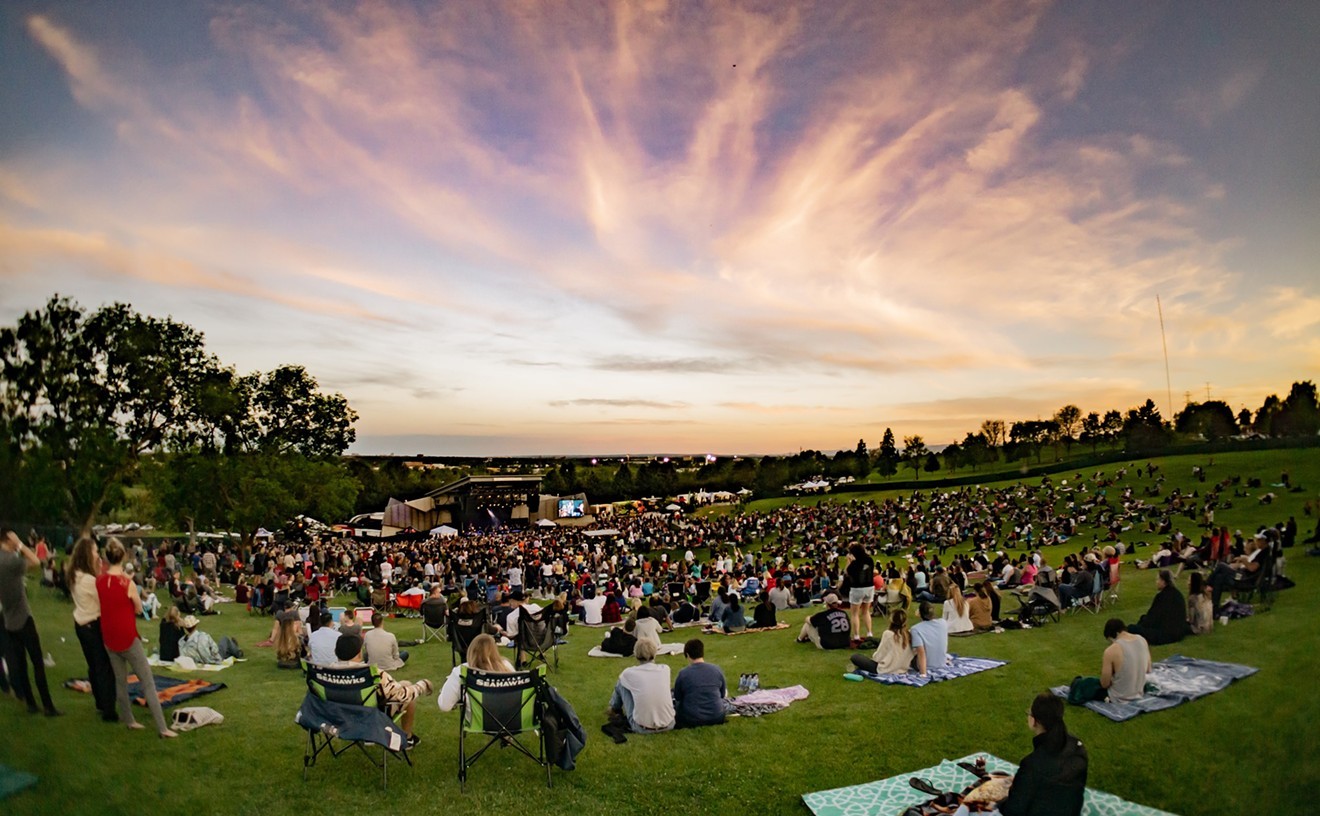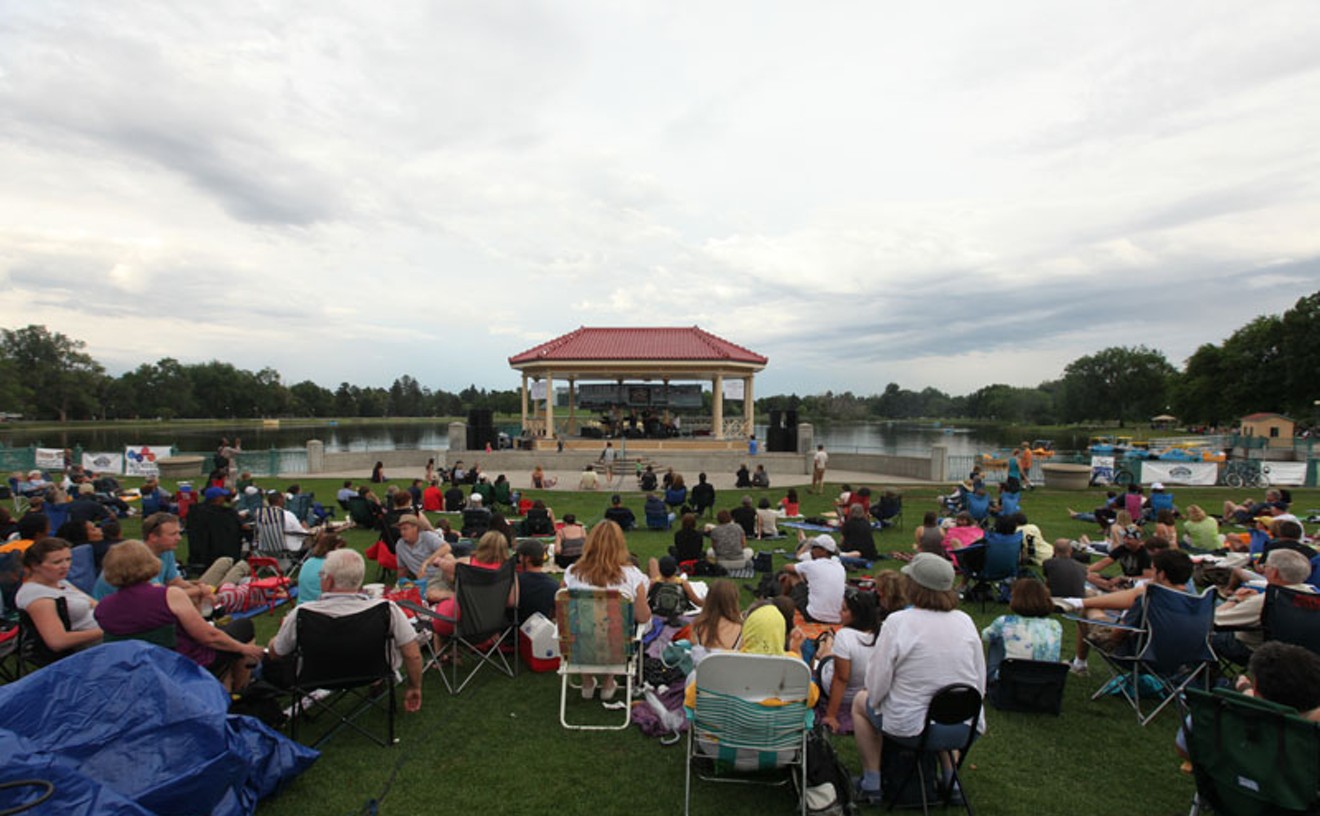Working within a genre that was known for its sycophantic, xeroxed bands of the secular mainstream, Five Iron Frenzy was unique and controversial, not shying away from using colorful language and discussing difficult political issues.
In 2003, Five Iron Frenzy announced its ironically titled farewell tour, "Winners Never Quit." A few months later, Roper resigned as co-pastor of Scum. He has since pursued various recording projects but has taken a sabbatical from being a rock star.
In 2004, he got married and moved into the Sunnyside neighborhood in northwest Denver. Recently finishing nursing school, Roper works as an RN for a retirement home and spends his free time caring for his newborn daughter and trying to catch up on sleep. I caught up with the Five Iron frontman on the phone as his three-month-old baby napped close by, the formerly boisterous punk-rocker whispering so as not to wake her.
Westword: What difficulties did you experience working within the world of Christian rock?
Reese Roper: In Five Iron Frenzy, we had far more acceptance outside the church than inside it. Very early on, we played a lot of bar shows, and we played the Ska Against Racism tour with Less Than Jake and Mustard Plug and a bunch of other bands. I think we were conditioned to think that we would be attacked outside of the church and be welcomed inside, but it was actually the opposite. The people in the church were like, 'Why are you playing in bars? Why are you doing this?'
What was your response to that?
[Laughs] "Well why aren't you?!" That's what Christ was all about. He didn't hang out with the religious people. He didn't hang out in the temple. He hung out with prostitutes and thieves. And tax collectors -- who were the thieves of their day.
But wasn't your popularity with young people in the Christian scene?
I think it became that way, which was actually a blessing. Playing Christian festivals and churches really paid a lot. Which freed us up to go play at bars and do tours with secular bands because, you know, it's hard to make a living being in a band with eight people. I think there are a lot of bands that can't really make it in the general market. And I think it's easier [in the Christian market]. If you write a song with the word Jesus in it every other word, then you can make a million bucks.
But it seemed like you guys were what the industry was looking for: A Christian alternative to Less Than Jake or Mustard Plug.
Maybe. I don't know. I think when we came on, it was one of the first times when Christian bands were not just copying what secular bands were doing.... I don't want to say in "history," because 100 or 200 years ago, all music was Christian music. But we just started playing ska because we liked it, and it happened to be the same time that ska got big in the rest of the world.
The argument that you "just played ska 'cause we liked it" makes me wonder about others in the Christian-rock market. How would that argument not work for them? DC Talk could say they switched from rap to rock because "they just liked it," right? I ask because you've probably been accused of being opportunists in the Christian-rock world, playing ska because Christians wanted a cultural counterpart to what was popular in the secular world. How was FIF different, as far as being "authentic," from, say, the Newsboys, Michael W. Smith or Carmen?
I believe that we were authentic compared to those bands because we sang about real life and actual problems that we had. It's one thing to say that Jesus changes you and makes you a better person, but completely another thing to say that because of that, you are sorry for being homophobic, or ignorant to the plight of Native Americans, or that blind nationalism is wrong -- things that are offensive to much of the Church but need to be said.
We weren't afraid to say those things -- whereas I think those other bands were either blind to them or afraid of losing their end-cap slots in the Christian bookstores by singing about them. After that, if people still liked us and appreciated us, I think we could have gotten away with playing any type of music we wanted.
It's easy to say that those bands may have been jumping on some bandwagon to be popular or to sell records, because lyrically -- and even their shows and the places they chose to play were inoffensive and candy-coated. No disrespect to them, because I think that the music of all of those people you mentioned is very edifying It just isn't groundbreaking -- or even trying to be.
How did FIF differ from its secular ska counterparts, like Less Than Jake and Mustard Plug?
I think that musically, we were both more poppy and a bit more complicated than those bands. The band that I think we resonated with the most in the secular world was the Mad Caddies. Message-wise, I think we just upset everybody. Too deep and convicting for the Christian market, and too Christian for the secular.
What you guys were writing about was different than most Christian bands, like Native American genocide or materialism in the Christian world. Did you have a lot of personal resentment for the Church?
I think a lot of us had been burned by Christians or burned by the church. How Scum was put together came out of that. We'd been in a band for two or three years by then, and I don't know if we resented that world but...I think if you look at the story of Christ when he was pointing his fingers, it was at the religious people. He would be mad at the Pharisees or the sadducees...but he still loved them. He still had friends who were Pharisees. When he died, Paul becomes his apostle -- who was a Pharisee.
When we as a band write about things that we hate, that becomes the church just because I feel it's the most hypocritical. If your only goal in life is to get ahead and live comfortably, and if you're using the name of Jesus to abuse people, using the power of the church to take advantage of weak people, there's nothing that makes me more angry. We ended up taking that to heart and wrote a lot of songs from it.
What were those early days at Scum like?
Keith and I were some of the forming members of Five Iron, and we'd just got kicked out of a church in Englewood -- because I had a nose ring and he had an eyebrow ring and we both had long hair. And they wanted us to cut our hair and take out the eyebrow ring. And it's not like we were trying to rebel -- it was a really cool church -- it's just that we were in bands and we thought it was fashionable.
So we started going to the church nearest to our church -- which ended up being Corona Presbyterian. And Mike was the young adults' pastor there. Mike was just a big mentor for us. He'd come to a lot of our shows. We had a youth group in the basement, because we were talking to a lot of people in bars about what we believed, and we couldn't just say, 'Oh, come to church with us!' Because our church was a little bit starchy. So we started a Bible study.
What was your relationship like as a co-pastor with Mike?
When we started Scum, Mike was in a transition period. The church had found a new head pastor, and he wanted his own staff, and anyone who wasn't with his program was asked to resign. And Mike was one of those people. So when he resigned, he said, 'Hey, we should start a church, like the Bible study. And I was like, 'Oh, cool! What do you want to do? I'll help you.' And he said, 'I want you to co-pastor with me.'
At the time, I had no business doing that -- I still don't. But he was like, 'You can speak every other week; I'll show you how to do it.' I was completely terrified. It took something like six months to a year to wear me down. He gave me tips about how to write a sermon, about public speaking. I think, at the time, my only public speaking was in high school, talking about nature. So my sermons were either really long and horrible, or they were only ten minutes long. Very early on, he mentored me.
How long did you pastor there?
Started in 2000 so...three years.
What ended your relationship with Scum?
I haven't really ended my relationship. They say I'm a "Pastor Emeritus," [laughs] which I think has no meaning. But it's funny, at least. I speak there every once in a while. Mostly if they just can't find anyone to speak, or if Mike's not speaking. I'm a little bit rusty; every time I do, it it's pretty bad.
In 2003, when Five Iron decided to break up, we toured all summer and then went straight through to November -- and by then I just couldn't give everything I needed to give [to Scum]. And the church had grown quite a bit by then; there were about 250 people going. So I wanted to formally resign -- to, you know, kick Mike in the butt and get him to find someone to replace me.
It seems that the common thread with Scum staff and members is that most of them have been kicked out of other churches. That this is a kind of oasis for people who don't have anywhere else to go.
I hope so. When we sat down to figure out what Scum was going to be, we wanted to make a church for people who had nowhere else to go. But unfortunately, it goes sometimes from being tha to being a kind of super-trendy thing that kids from the suburbs or kids on a mission trip come in and they do it just 'cause they think it's cool.
But also [laughs], I love that there's kids from Minneapolis who come to see Denver like on some high school trip and their youth pastor talks them into coming to Scum and they're sitting in between homeless people. That, to me, is amazing. I think there are things that happen all the time at Scum that are shocking to everyone. It happens quite a bit where Mike will be giving a sermon and someone will be in there drunk, and they'll just start yelling at them; then someone will have to take that person outside and calm them down.
That diversity, it seems, is intentional and integral to what Scum is all about. Everyone is welcome. No labels. But it also seems that their apprehension to label themselves has led to other people trying to do it for them, calling them gay-hating, anti-woman fundamentalists.
Well, I think you're right. It's nice sometimes to label yourself just to keep some people from doing it for you. But my hope is that if Scum is labeled, it's through what they do. If someone's going to say they're patriarchal, they just need to come to some services. I mean, it's church in its loosest form.
And also, they're not zealots. They don't have any outreach. The atheists I've talked to, who live with them, say, "They don't preach to us. They'll talk to us if we ask, but they aren't trying to convert us."
I think a huge part of that is that a lot of the people there left other churches for that reason. They've been the victim of that kind of Christianity; it leaves a bad taste in your mouth. You either get to a point in your belief where you decide "What I know is exactly right, and I'm going to make everyone else believe it." Or you get to a point where the further you get into Christianity, you realize, "I don't really know much. I can't tell you anything definite except that Jesus Christ is real, and he loves me, and he changed my life."
So when you get to that point, you just drop all those evangelical pretenses. A lot of people go through that, where they first become a Christian, where they're really zealous, and they have to share everything with their friends and their family, and they're really obnoxious. Or the worst part is where it's fear-driven -- where you have to scare people about Hell and all that. And some people get stuck in that. And people at Scum have moved past that. They realized that what originally drew them to Christ is that they believed he loved them. That he is merciful, and he is peaceful, and that if they want to follow Christ, then they have to be like that.
Many secular punks hate the idea of others claiming to be punks and Christians.How important is personal identity when you're young and want to believe in God but are excited about punk rock?
I think that is so funny, because the punk scene readily accepts the straight-edge movement and doesn't even look twice at all the vegans and vegetarians in their midst -- but somehow gets offended by Christians. It's like it's almost expected of you to conform to some sort of super-rigid set of rules while you are going through this rebellious phase in your life, and anything is game EXCEPT Christianity.
To me, Christ is the quintessential rebel. He was homeless. He hung out with thieves and prostitutes. He swore at the religious establishment as He chased them from their own temples. He gave when it was counter to human nature. He loved when it would only bring Him pain. He was peaceful when the rest of us would have fought back -- and He was fearless in the face of it all.
I think it's the Church who has missed this throughout history, not some kid who is claiming to be both punk and Christian. True Christianity is far more rebellious than being straight-edge or vegan. And that's the thing: I think any kid who grasps the actual counterculture and rebelliousness of Christ doesn't have far to go to be a punk, because it's already there beneath the surface.
The punk scene can say what they want about it -- as long as they acknowledge that straight-edge is just some type of secular monasticism, and all vegans are really, in fact, just hippies.










